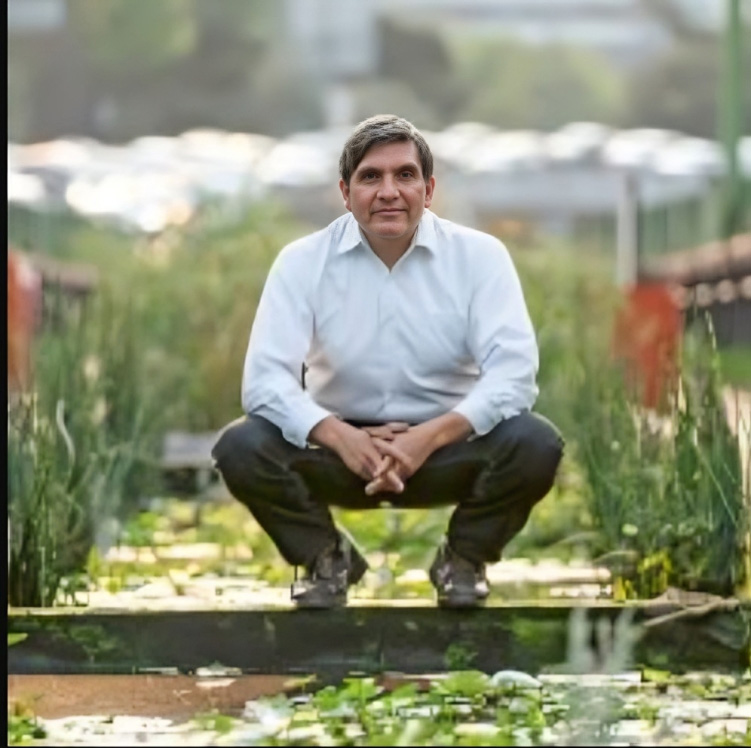Research interests
• Rehabilitation and sustainable management of aquatic ecosystems
• Cyanobacterial epidemiology
• Design, planning, management, and consulting in constructed and natural wetlands
Accessibility Tools

Dr. Alejandro Federico Alva Martínez pursued his undergraduate studies from 1991 to 1996 at the Universidad Autónoma Metropolitana (UAM) in Biological Sciences, focusing on Aquatic Ecosystems. Subsequently, he pursued his graduate studies at the National Autonomous University of Mexico, where he obtained a Master of Science degree in Systems Biology and Aquatic Resources from 1999 to 2003. Following this, he completed his doctoral studies at the Universidad Autónoma Metropolitana in Biological Sciences, specializing in Limnology (Biomanipulation, Water Body Rehabilitation, Ecoxicology) from 2003 to 2007.
Currently, Dr. Alejandro Federico Alva Martínez is a Full-Time Associate Professor at Career Level D, affiliated with the Department of Hydrobiology within the Division of Biological and Health Sciences at the Iztapalapa Campus of UAM.
His professional development experience has been marked by the acquisition and refinement of specialized skills in various aspects related to water bodies. Particularly, he has focused his efforts on characterizing inland and coastal water bodies, dedicated to understanding their dynamics, structure, and functions. His focus has expanded towards the sustainable rehabilitation of aquatic ecosystems, specifically targeting eutrophicated environments. Through projects, he has worked to develop effective strategies to restore the health and balance of these ecosystems, addressing the challenges associated with eutrophication. Additionally, he has specialized in cyanobacterial blooms and the epidemiology of cyanotoxins, addressing the complexities associated with the presence of these toxic substances in water bodies. His approach also includes the design, creation, and construction of both artificial and natural wetlands to use them as effective tools to mitigate the adverse effects of these phenomena.
His career also encompasses urban ecology and the implementation of nature-based solutions strategies. He has worked on integrating aquatic elements into the urban environment, promoting sustainable practices that harmonize with urban development and environmental conservation. Furthermore, he has ventured into the field of aquaponics, merging aquaculture and plant cultivation into a symbiotic system. This experience has allowed him to explore innovative and sustainable solutions for food production and the integrated management of aquatic resources. Together, these skills and experiences reflect his ongoing commitment to understanding and preserving aquatic ecosystems, as well as his ability to address complex challenges and find solutions that promote sustainability and harmony between humans and nature. Socially, in 1999, he was a co-founder of the Water Bodies Network of Mexico City.
He also has profound knowledge in issues related to Environmental Impact Assessments and Declarations.
Some of his experiences include:
Water body management: Virgilio Uribe Rowing and Canoeing Track, Cuitlahuac Lake, Alameda Oriente Lake, Tezozomoc Lake.
Constructed wetlands: Virgilio Uribe Rowing and Canoeing Track, Aragón Forest I and II, Chapultepec Minor Lake, Cuemanco Underpass, Viaduct Linear Park Ecotunnel, Cuitlahuac Lake Wetland, Mixcoac River Wetland, Cuautepec Regulator Basin Wetland.
Advising on the creation of wetlands at: Cerro de la Estrella, Cuitlahuac Park, Axolotl Museum.
Cyanobacteria and cyanotoxins: Head of the postgraduate course on Cyanotoxins at ICMyL, resolution of cases of cyanotoxin poisoning epidemiology in Manatees (Tabasco), elephants (Botswana), Humans (Xochimilco, State of Mexico, and Tabasco).
*Courses are conducted in spanish
| Num. | Trim. | Course Name | Level |
|---|---|---|---|
| Limnología | Licenciatura | ||
| Proyecto de Investigación I | Posgrado | ||
| Seminario de Investigación I | Posgrado | ||
| Historia y Situación Actual del Agua en el Valle de México | Licenciatura | ||
| Limnología | Licenciatura | ||
| Introducción a la Limnología | Licenciatura | ||
| Manejo de Ecosistemas Acuáticos | Posgrado | ||
| Seminario Internacional O Intercultural I | Posgrado | ||
| Temas Selectos en Ecología y Medio Ambiente I | Posgrado | ||
| Proyecto de Investigación III | Licenciatura | ||
| Historia y Situación Actual del Agua en el Valle de México | Licenciatura | ||
| Limnología | Licenciatura | ||
| Proyecto de Investigación III | Licenciatura | ||
| Desarrollo Sostenible | Licenciatura | ||
| Paquete de Desarrollo II | Licenciatura | ||
| Paquete de Desarrollo I | Licenciatura | ||
| Limnología | Licenciatura | ||
| Proyecto de Investigación II | Licenciatura | ||
| Evaluación de Impacto Ambiental | Posgrado | ||
| Biotecnología Acuícola | Licenciatura | ||
| Temas Selectos en Ecología y Medio Ambiente I | Posgrado |